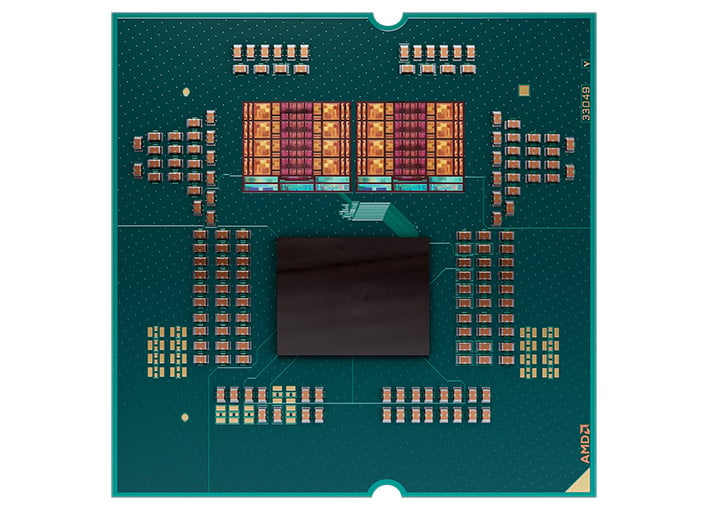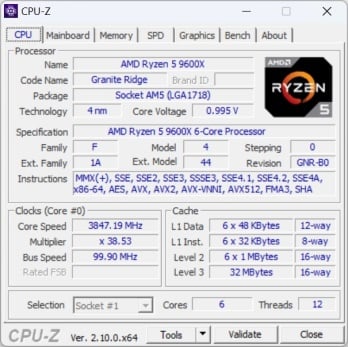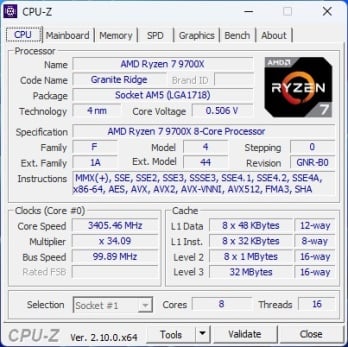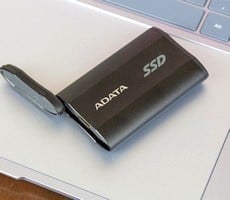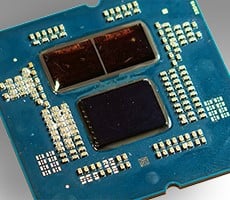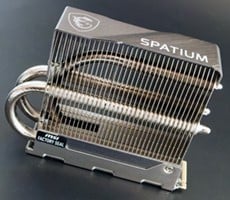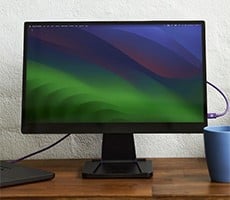Ryzen 5 9600X & Ryzen 7 9700X Review: Low Power AMD Zen 5 Impresses
| AMD Ryzen 7 9700X - $359, Ryzen 5 9600X - $279 These chips drop into the same Socket AM5 as AMD's previous generation, but bring higher performance and better power efficiency along with a slight price reduction that sweetens the deal. Here's a full suite of benchmarks and performance analysis.
|
|||

|

 |
||
The official launch of the AMD Ryzen 9000 series processors based on Zen 5 arrives today, just a tad later than AMD had originally intended. A quality issue popped up when the first wave of Ryzen 9000 processors were out in the wild, which forced AMD to pull them back in favor of replacements that went through another round of qualification testing. Thankfully, the delay was short-lived and here we are, ready to shine the spotlight on the AMD Ryzen 7 9700X and Ryzen 5 9600X. AMD's higher-end Ryzen 9 9900X and 9950X won’t be launching until next week, so stay tuned for more details here at HotHardware.
We have no shortage of information regarding AMD's Ryzen 9000 series. Our initial coverage of their unveiling at Computex is available here, and we’ve also posted a deep-dive into the Zen 5 architecture for those that are more technically inclined. We’ve also already reviewed the Zen 5-based Ryzen AI 300 series mobile processors, though those are based on a different slice of silicon. Both the Ryzen AI 300 series mobile processors and Ryzen 9000 series desktop parts leverage Zen 5, but they feature completely different configurations. Current Ryzen AI 300 series processors are based on a monolithic die codenamed Strix Point, while the AMD Ryzen 9000 series – codenamed Granite Ridge – features one or two compute chiplets linked to an IO die on a single package, just like previous-gen Ryzen desktop processors.
The AMD Ryzen 9000 Series Processor Line-Up
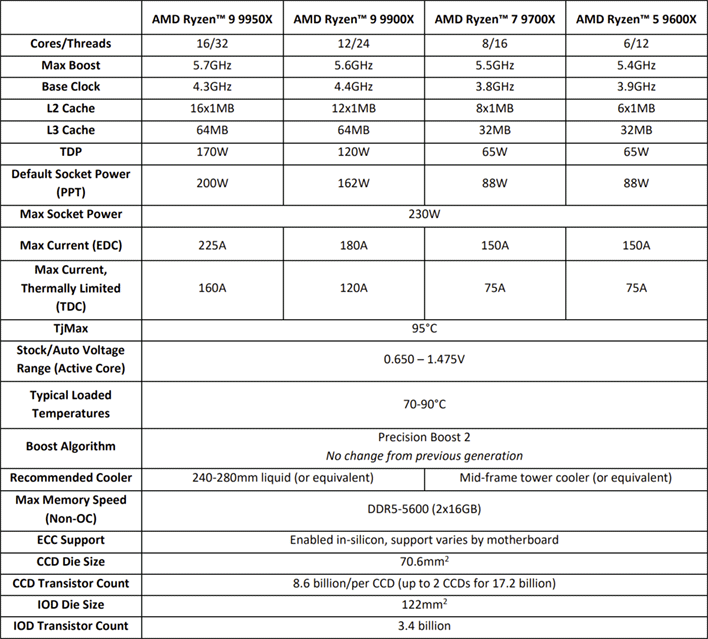
Find AMD Ryzen 9000 Series Processors @ Amazon
Unlike previous-gen Ryzen desktop processors though, the two mainstream Ryzen 5 and 7 chips arrive with only 65W TDPs. Previously, lower TDPs were reserved for the “non-X” branded parts. The Ryzen 9 9900X has a relatively modest 120W TDP, and the top end Ryzen 9 9950X is 170W. As is the case with all Ryzen desktop processors, all of these parts are fully unlocked for easier, more flexible overclocking.
Base and boost clocks also differ between the processors, and they're not the same as the Ryzen 7000 series processors either. For example, a Ryzen 9 9950X will offer a 5.7GHz boost clock from with a 4.3GHz base clock; that base clock is actually 200MHz lower than Ryzen 9 7950X. Looking specifically at the two processors we’ll be showing you here today, the Ryzen 7 9700X has a 100MHz higher boost clock than a 7700X, but a 700MHz lower base clock. And the Ryzen 5 9600X has a 100MHz higher boost clock but an 800MHz lower base clock against a 7600X. That may sound like a massive difference, but in the real world, those base clocks don’t often come into play, and Zen 5's Instructions-per-Clock (IPC) is higher than Zen 4 as well.
As you’d expect, cache sizes also differ between the various Ryzen 9000 series processors, with the flagship 9950X offering up to 80MB of combined L2+L3 cache, while the mainstream Ryzen 5 9600X clocks in at 38MB, and the 9900X and 9700X sit in between. The single-CCD Ryzen 5 9600X and Ryzen 7 97000X have 32MB of L3 available, but the dual-CCD Ryzen 9 chips both have 64MB of L3, hence the much larger total cache on the higher-end parts.
Introducing The Ryzen 5 9600X & Ryzen 7 9700X
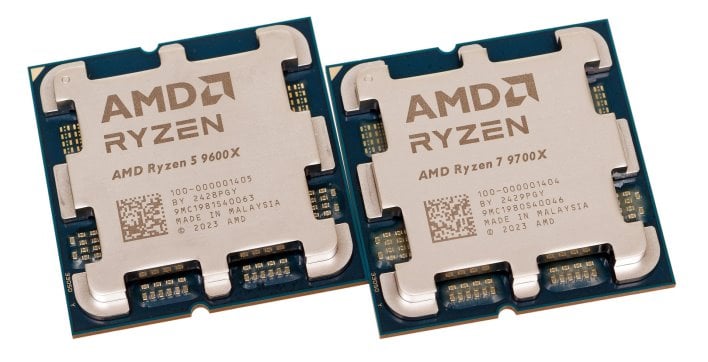
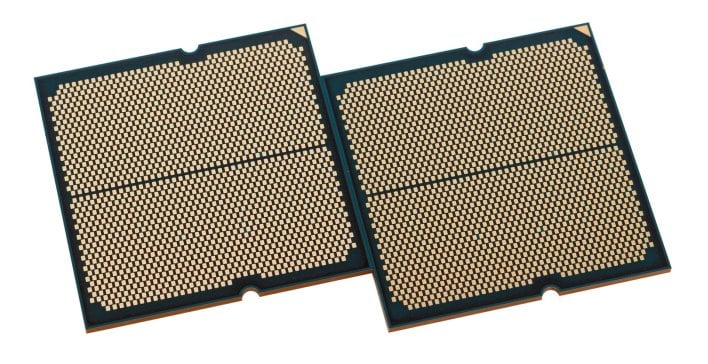
Ryzen 5 9600X & Ryzen 7 9700X Top And Bottom Views
As mentioned, for this first Ryzen 9000 series review, we got our hands on a pair of processors -- the mainstream Ryzen 7 9700X (8-cores) and Ryzen 5 9600X (6-cores). Although they feature a new compute die manufactured on TSMC’s 4nm process node versus previous-gen Ryzen 7000 series processors, externally they look identical. The Ryzen 9000 series features the same heat spreader design and obviously the same LGA design with 1,718 pads for Socket AM5. As such, the Ryzen 9000 series is compatible with all of the same coolers and AMD 600-series chipset-based motherboards, provided said motherboard has received the necessary BIOS/UEFI update. Newer AMD 800-series chipsets are slated to arrive a little later in the year.
The Ryzen 7 9700X and Ryzen 5 9600X both shipped is small, slim, boxes that are much smaller than previous-gen processors. None of the Ryzen 9000 series processors will include a heatsink in their retail boxes, but do include Ryzen 5/7/9 decals, a protective case for the processor, and a basic lit pack with warranty information.
AMD Ryzen 9000 Series CPU-Z Details
The actual processor packages here resemble every other Socket AM5 chip. Save for the branding etched on top, the heat spreader and packaging remain unchanged from the previous-gen Ryzen 7000 series. A quick glance at CPU-Z, however, will reveal the main differences...If we plug these new AMD processors in and take a look at what CPU-Z reports, you can see there is 80K of L1 per core (48K D-Cache [12-way] + 32K I-Cache [8-way]), which is an increase from 64K on Zen 4 / Ryzen 7000. There’s also 1MB of L2 cache per core, which is 16-way set associative. The L1 D-cache and L2 on Zen / Ryzen 7000 were both 8-way set associative. There’s also 32MB of L3 cache per compute die, for 32MB total on these two processors. AMD's higher-end Ryzen 9 12-core and 16-core processors will feature dual compute chiplets + IO die, so they'll have a total of 64MB of L3, and the total amount of L1 and L2 will scale accordingly with the number of cores.

